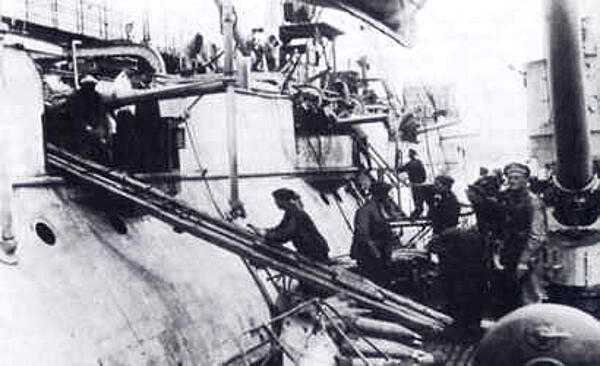Unrestricted Submarine Warfare
On 9th January 1917, the use of unrestricted submarine warfare was official announced. This move was to have a huge impact ton the outcome of the war, even resulting in America joining the war.
German Chancellor Bethmann Hollweg was responsible for announcing Germany’s intention to use unrestricted submarine warfare, despite concerns that it may provoke the US.
The main reason for this decision was that the war was not going well for Germany on the Western Front and the Battle of Jutland has also proved Germany wasn’t strong enough to win from the sea. Specifically, Germany were unable to attack merchant ships travelling to Britain and so could only tackle British supplies by attacking ships from America.
However, this would have to be achieved using submarines, and for this Bethmann Hollweg decided that they must adopt a policy of a completely unrestricted attack.

Unfortunately, German’s opinion of its U-boats were overestimated, while concerns that they may anger neutral targets were well-founded. As early as 1915, Admiral von Pohl had wanted neutral shipping in the ‘war zone’ (the English Channel and other waters around the UK) attacked, believing that sinking neutral ships would scare off trade ships.
However, with a U-boat fleet that couldn’t cope with such a large campaign and concern for ethics and the rules of war, this didn’t take place. However, on February 18th 1915, Germany did announce that it would start a commerce war against any country trading with the UK. America responded by sending a note to Germany, stating that they would be held responsible for any American ship sunk. Unable to protect themselves if they provoked a war against America, Bethmann-Hollweg demanded that Germany exclude neutral ships from the order.
The following month, 5,000 ships entered and exited British ports, with only 21 sunk. This encouraged trading to continue. Following the sinking go the British liner ‘Lusitania’, which was sunk two months laster with 128 Americans on board, President Woodrow Wilson was expected to retaliate. However, he confirmed Germany’s had a new approach of surfacing their submarines and only sinking merchant ships once the crew had been removed safely. This prevented him from joining the war.
However, the Germans navy had no intention of carrying out such a policy, stating that it would be dangerous for their own crews. In fact, on 6th June 1915, Wilhelm II ordered that all large passenger liners, whether neutral or Allied, must not be attacked, but a British liner was attacked without warning just two months later.
In September 1915, Wilhelm decided to change his naval chief of staff, replacing Vice-Admiral Bachmann with Admiral von Holtzendorff, who was more supportive of Bethmann-Hollweg. Holtzendorff adhered to Wilhelm’s plans, ordering U-boats to come to the surface before attacking. However, this ended the German navy’s U-boat activity around Britain as they felt this was too dangerous for its crews.
As the war progressed, opinions changed. In February 1916, Holtzendorff withdrew his order and stated that there should be “intensified” U-boat activity in the ‘war zone’. This encouraged many to move towards the attitude that unrestricted submarine warfare was necessary, as was supported by General Erich von Falkenhayn, chief of the army general staff, who wanted to weaken the enemy.
Bethmann-Hollweg was now facing a united front from the army and navy, and in March 1916 met Falkenhayn and Wilhelm II in Charleville. Wilhelm felt he was unable to make the decision, and in March the military and Bethmann-Hollweg agreed that all merchant ships would be destroyed within the war zone but the old orders would apply outside the war zone.
This decision remained a secret, but the resulting attacks suggested to the Americans that unrestricted warfare had begun. Following an attack on a cross-Channel steamer, Woodrow Wilson send a note to Berlin stating that they would withdraw diplomatic ties should the attacks continue.
Wilhelm II ordered that the original orders would now apply once more and the U-boats subsequently stopped their campaign in British waters. In May 1916, German agreed to the demands of the American government and stated that they would adhere to international law.
Unfortunately for Bethmann-Hollweg, the loss of life at Verdun and the Somme resulted in Falkenhayn being replaced by Ludendorff and Hindenburg. The latter proved to be a strong supporter of unrestricted submarine warfare and both new commanders felt it was the only way to counter ongoing military losses for the Germans.
By 1917, Germany was in a better position to engage in unrestricted submarine warfare, with a fleet of 46 large submarines and 23 U-boats. Navel intelligence suggested that these vessels could destroy 600,000 tonnes of shipping per months, which would double that of the previous year and had the potential to starve Britain within five months.
The decision for unrestricted submarine warfare was made on 1st February 1917. Wilson immediately broke off diplomatic relations with Germany in an effort to force the country’s hand, but when Britain intercepted a message to Mexico stating that Germany would provide support if it attacked its neighbour, America’s stance was set in stone.
By 21st March, seven American merchant ships had been sunk by the Germans and Wilson summoned Congress. On 6th April 1917, American entered the First World War.
MLA Citation/Reference
"Unrestricted Submarine Warfare". HistoryLearning.com. 2026. Web.
